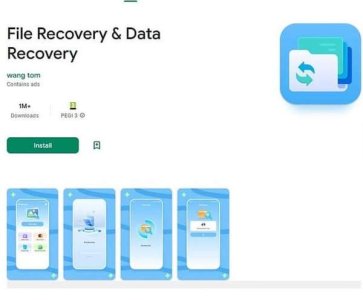Is your data being sent to China? Over 1.5 million Android users are infected by spyware apps!
The world of technology truly is an astounding one. It presents us with convenient solutions, on-the-go assistance, and intuitive functionality.
But, as we dive deeper, it adds another layer of complexity and potential danger in terms of data privacy and security.
The digital world presents advantages and risks. Take smartphones, for example. We appreciate the convenience of having apps readily available, but it is also true that certain Android users have become victims of deceptive spyware apps. These apps compromise our data and make us vulnerable targets for hackers.

Over 1.5 million Android users unwittingly got straight into the crosshairs of such a predicament after downloading two menacing spyware apps named 'File Recovery & Data Recovery' and 'File Manager.'
Alarmingly, these apps originated from none other than the Google Play Store itself.
Please take immediate action and uninstall these apps if they are installed on your device.
These applications deceive users while covertly extracting valuable information, such as contact lists, personal photos, private videos, and even real-time locations. Reports indicate that the apps were developed in China.
Pradeo, a cybersecurity firm, brought this discovery to light and took immediate action to report these sly apps to Google, the tech giant that oversees Google Play Store.
As wily as these apps can be, they do have a telltale sign. They both dupe the same developer name, 'Wang Tom', who falsely discloses that no data collection occurs from users.
These apps not only collect our crucial data but also employ stealthy tactics by hiding their home screen icons, making it difficult to detect and uninstall them.
These deceptive apps adopt a disguise, appearing harmless on the surface while exploiting approved permissions to restart your device and operate covertly in the background.

Their true intentions remain concealed, making it challenging to recognise their malicious activities. Operating stealthily, they breach privacy boundaries, syphoning valuable data and transmitting it to distant locations without detection.
Pradeo unearthed that these apps could gain access to an assortment of personal details—from email accounts and social networks to mobile network provider names and mobile country codes.
Google has taken action by removing these apps from its Google Play Store. However, users are now required to manually delete the apps from their devices.
To uninstall these apps, visit your device's Settings, select Apps to review the applications running on your device, and promptly remove any suspicious invaders.
Don't forget to check your device regularly, especially after these recent revelations.
Earlier this month, Google issued a warning to Android users regarding a security threat that poses a risk to their banking information.
The security team at ThreatFabric, another cybersecurity firm, discovered this threat and has utilised apps uploaded to the Google Play Store to distribute the fraudulent Anatsa banking trojan, which aims to steal sensitive data.
Once the trojan is installed on a device, it can extract credentials that allow unauthorised access to the user's mobile banking account.
This grants hackers control over the account, enabling them to access personal information, credit card details, bank balances, payment data, and even transfer funds without arousing suspicion from the cardholder.
ThreatFabric emphasises the difficulty in detecting this threat since transactions originate from the same device that targeted bank customers regularly use, making it challenging for banking anti-fraud systems to identify fraudulent activity.
Security researchers from the tech company have been monitoring the situation and have observed that this method alone has resulted in over 30,000 installations of the trojan.

The world of technological wonders has occasional pitfalls. But don't fret, dear Seniors Discount Club members! Let's embrace the marvels of modern technology but remember to tread with caution.
Stay informed, stay alert, and continue to enjoy the digital comfort zone with a discerning eye.
Members, how concerned are you about the presence of spyware apps on the Google Play Store? What precautions do you take to ensure the security and privacy of your personal information while using mobile applications? Share your thoughts and experiences on this issue.
But, as we dive deeper, it adds another layer of complexity and potential danger in terms of data privacy and security.
The digital world presents advantages and risks. Take smartphones, for example. We appreciate the convenience of having apps readily available, but it is also true that certain Android users have become victims of deceptive spyware apps. These apps compromise our data and make us vulnerable targets for hackers.

Cybersecurity is an essential field that protects digital systems and networks from unauthorised access, data breaches, and other malicious activities. Source: BleepingComputer
Over 1.5 million Android users unwittingly got straight into the crosshairs of such a predicament after downloading two menacing spyware apps named 'File Recovery & Data Recovery' and 'File Manager.'
Alarmingly, these apps originated from none other than the Google Play Store itself.
Please take immediate action and uninstall these apps if they are installed on your device.
These applications deceive users while covertly extracting valuable information, such as contact lists, personal photos, private videos, and even real-time locations. Reports indicate that the apps were developed in China.
Pradeo, a cybersecurity firm, brought this discovery to light and took immediate action to report these sly apps to Google, the tech giant that oversees Google Play Store.
As wily as these apps can be, they do have a telltale sign. They both dupe the same developer name, 'Wang Tom', who falsely discloses that no data collection occurs from users.
These apps not only collect our crucial data but also employ stealthy tactics by hiding their home screen icons, making it difficult to detect and uninstall them.
These deceptive apps adopt a disguise, appearing harmless on the surface while exploiting approved permissions to restart your device and operate covertly in the background.

In some instances, hackers utilise apps as a disguise or means to conceal their identity and carry out cyberattacks. Source: BleepingComputer
Their true intentions remain concealed, making it challenging to recognise their malicious activities. Operating stealthily, they breach privacy boundaries, syphoning valuable data and transmitting it to distant locations without detection.
Pradeo unearthed that these apps could gain access to an assortment of personal details—from email accounts and social networks to mobile network provider names and mobile country codes.
Google has taken action by removing these apps from its Google Play Store. However, users are now required to manually delete the apps from their devices.
To uninstall these apps, visit your device's Settings, select Apps to review the applications running on your device, and promptly remove any suspicious invaders.
Don't forget to check your device regularly, especially after these recent revelations.
Earlier this month, Google issued a warning to Android users regarding a security threat that poses a risk to their banking information.
The security team at ThreatFabric, another cybersecurity firm, discovered this threat and has utilised apps uploaded to the Google Play Store to distribute the fraudulent Anatsa banking trojan, which aims to steal sensitive data.
Once the trojan is installed on a device, it can extract credentials that allow unauthorised access to the user's mobile banking account.
This grants hackers control over the account, enabling them to access personal information, credit card details, bank balances, payment data, and even transfer funds without arousing suspicion from the cardholder.
ThreatFabric emphasises the difficulty in detecting this threat since transactions originate from the same device that targeted bank customers regularly use, making it challenging for banking anti-fraud systems to identify fraudulent activity.
Security researchers from the tech company have been monitoring the situation and have observed that this method alone has resulted in over 30,000 installations of the trojan.
Key Takeaways
- More than 1.5 million Android users have downloaded two China-based spyware apps from the Google Play Store.
- The apps, ‘File Recovery & Data Recovery’ and ‘File Manager’, allegedly scraped users' personal information, including contact lists, pictures, videos and real-time user location.
- Cybersecurity firm Pradeo found and reported the malicious apps to Google, which have since been removed from the store.
- Android users are urged to manually delete these apps from their devices, as the personal data collected is prone to hackers.
Stay informed, stay alert, and continue to enjoy the digital comfort zone with a discerning eye.
Members, how concerned are you about the presence of spyware apps on the Google Play Store? What precautions do you take to ensure the security and privacy of your personal information while using mobile applications? Share your thoughts and experiences on this issue.







